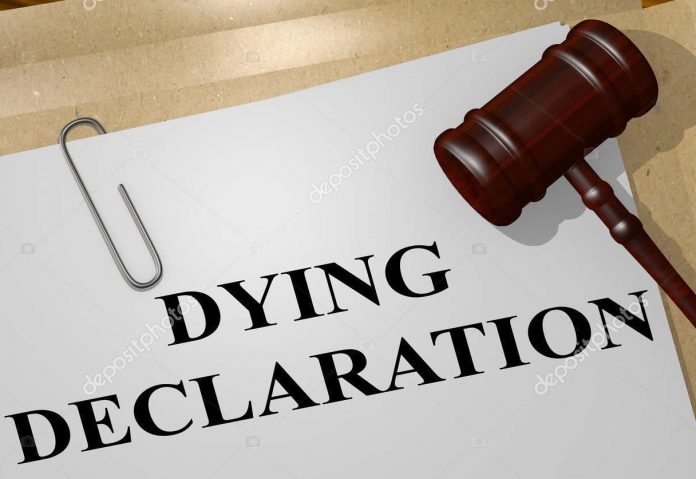This article has been written by Saurav Narayan, pursuing a Certificate Course in Advanced Criminal Litigation & Trial Advocacy from LawSikho.
Table of Contents
Introduction
Mr. Ram was passing by Tilak Nagar Road, Delhi one Mr. Ravan, who was the enemy of Mr. Ram, pulled out a knife from his pocket and cut the throat of Mr. Ram. Out of pain Mr ram tried to shout for help, a nearby police van heard the voice of Mr. Ram and rushed to the event where police saw that Mr. Ram was lying on the road and showing his finger towards Mr. Ravan who was sitting in the back seat of running motorcycle after that police asked Mr. Ram who cut your throat? But Mr. Ram could not speak as his throat was cut and he was bleeding and he again showed his finger towards Mr. Ravan. Police again asked the person who was sitting behind the back of the running motorcycle? Ram nodded his head in affirmative and after this Mr. Ram died. Now the moot question that arises here is whether Mr. Ram’s dying declaration be the sole reason for the conviction of Mr. Ravan? In this article we will discuss briefly the concept of dying declaration, Legislation prescribed, who can record dying declaration, forms of dying declaration, and the moot question with the help of relevant case laws.
Concept of dying declaration
“Truth sits upon the lips of dying men, and falsehood, while I lived, was far from mine,” said Matthew Arnold. The concept of dying declaration comes from the legal maxim “Nemo moriturus praesumitur mentire”, which means “a man will not meet his maker with a lie in his mouth” The statements made by a deceased person before his death where the person describes the cause of his death or as to circumstances that leads to his death is called a dying declaration. Indian statute acknowledges the fact that ‘Truth sits upon the lips of dying men.’ Or a man will not meet his maker with a lie in his mouth.’ On this note let us look at the legislation prescribed.
Legislation prescribed of dying declaration and its essentials
The concept of dying declaration is explained in Section 32(1) in The Indian Evidence Act, 1872 is one of the exceptions to the general rule prescribed in Section 60 in the Evidence Act,1872 which explains that oral evidence in all instances must be direct i.e. it must be the evidence of testimony. Even though a dying declaration has not been made under oath and the person making it cannot be cross-examined still it is accepted in the court.
Ingredients of dying declaration
- The person who is giving the dying declaration must die.
- The dying declaration must not be incomplete.
- It must be done without any extra compulsion and freedom.
- The cause of death must be explained which leads to the death of the deceased or at least the circumstances which lead to his death must be explained.
- The declarant who is making a dying declaration must be conscious of what is happening near him.
- The person must be of sound mind.
- The cause of death of a person must be in question.
Let us quickly look at who can take down dying declarations.
Who can take down a dying declaration?
Any person can take down a dying declaration provided the deteriorating condition of the declarant depending on the facts and circumstances of the case, even a police officer’s recorded dying declaration is legitimate. If a competent Magistrate does not record a dying declaration, it is preferable to obtain the signatures of witnesses who are present at the time of recording.
Forms of dying declaration
In the case of Queen-Empress vs. Abdullah, the accused had cut the throat of a declarant girl, consequently she unable to speak, but she was able to demonstrate who was guilty using signs made with her hands. It was held by Allahabad High court that the dying declaration can be in the form of written, oral, gestures, and signs.
In Mukesh & Anr vs State For Nct Of Delhi & Ors which is also known as Nirbhaya case 2013, a divisional bench of Hon’ble Justice Deepak Mishra, R Banumathi, and Ashok Bhushan said a dying declaration is not always verbal or written. It can be done with a gesture or a nod.
A “dying declaration” is a statement made by a declarant about the reason for his death, the injuries that led to his death, or the conditions under which injuries were inflicted. A dying declaration is thus admissible in court on the basis that the anticipation of mortality produces the same human emotions as a conscientious and guiltless person testifying under oath. It is a statement made up of a person’s last words before death, which are presumed to be true and free of any purpose or malice. The dying declaration is therefore admissible in evidence on the ground of necessity, as the declarant has very little chance of life, and if proven reliable, it can undoubtedly lead to a conviction. On this note let us look at the various judgments by the Supreme Court and the High Courts which will help us in understanding the moot question.
The Supreme Court of India in Kushal Rao vs The State of Bombay established the following principles regarding dying declaration.:
- There is no absolute rule of law that states that a dying statement cannot be used as the sole ground for conviction unless it is backed up by other proof. A real and voluntary declaration that is free from compulsion needs no corroboration.
- Each case must be determined after seeing the fact and circumstances of the case in which the dying declaration was required.
- A dying declaration is a not weaker evidence than any other form of evidence.
- A dying declaration, like any other piece of evidence, must be assessed in view of the surrounding circumstances and in accordance with the rules regulating the weight of evidence.
- A dying declaration recorded in an appropriate manner, that is, in a question-and-answer method, by a competent magistrate and as far as possible in the words of the declarant, will stand on the higher footing rather than a dying declaration which depends on oral testimony, which is susceptible to many of the flaws in human memory and character.
- To test the reliability of a declarant the court must keep in mind the circumstances like the possibility of the dead man for observation.
In, State Of Uttar Pradesh vs Ram Sagar Yadav And Ors Apex court held that the primary effort of the Court must be to see if the dying declaration is authentic. If the court can find that there is no need for further corroboration. The Supreme Court of India has established broad principles in the decision of Atbir vs Govt. Of N.C.T Of Delhi :
- If the court has full faith in the dying declaration, it can be used as the sole basis for conviction.
- The court must be convinced that the declarant was mentally stable while making the statement and that it was not the repercussion of tutoring, prodding, or imagination.
- If the court is convinced that the declaration is true and voluntary, it can convict without the need for further corroboration.
- A dying declaration cannot be rejected or dismissed simply because it is short. On the contrary, the statement’s brevity ensures its accuracy.
- There is no rule of law or prudence that has hardened into a rule of law that stipulates a dying declaration cannot be acted upon unless it is corroborated.
- The law is that if the bench is complacent that the dying declaration is authentic and made voluntarily without any compulsion by the declarant, a conviction can be based solely on it. In that case, no corroboration is needed.
- A dying declaration should not be dismissed just because it lacks specific information about the event.
- Normally, the court will seek medical advice to determine whether the declarant was mentally stable while making the dying declaration. However, where an eyewitness has said that the declarant was mentally stable while making the dying declaration, the medical opinion cannot prevail.
- If a dying declaration appears to be suspicious, it should not be followed up on without corroborative evidence.
- If after careful examination, the bench is satisfied that it is authentic and free from any effort to induce the declarant to make an untruthful statement and if it is coherent and consistent, there shall be no legal obstruction to make it the basis of conviction, even if there is no corroboration.
Conclusion
LORD LUSH, L.J., quoted that “A dying declaration is admitted in evidence because it is presumed that no person who is immediately going into the presence of his maker, will do so with a lie on his lips. But the person making the declaration must entertain a settled hopeless expectation of immediate death. If he thinks he will die tomorrow it will not happen.”A dying declaration has a lot of weight, but it is important to remember that the accused does not have the power to cross-examine the declarant to uncover the truth. As a result, the court must be satisfied that such a declaration is true and that it has not been influenced in any way. The court must ensure that the deceased’s statement was not the result of tutoring, prodding, or a product of the imagination. If the court is convinced that the declaration was true and voluntary, it will very certainly be able to convict without further evidence. It cannot be established as an absolute rule of law that the dying declaration cannot be used as the only basis of conviction unless it is backed up by other evidence. The requirement for corroboration is only a precautionary measure.
References
- https://tilakmarg.com/opinion/dying-declaration-can-be-the-sole-basis-for-convicting-the-accused/
- https://kjablr.kar.nic.in/sites/kjablr.kar.nic.in/files/11.%20Dying%20Declaration%20-%20Its%20applicability%20in%20Criminal%20Cases.pdf
- https://districts.ecourts.gov.in/sites/default/files/Forth%20Topic_1.pdf
Students of Lawsikho courses regularly produce writing assignments and work on practical exercises as a part of their coursework and develop themselves in real-life practical skills.
LawSikho has created a telegram group for exchanging legal knowledge, referrals, and various opportunities. You can click on this link and join:
 Serato DJ Crack 2025Serato DJ PRO Crack
Serato DJ Crack 2025Serato DJ PRO Crack










 Allow notifications
Allow notifications


